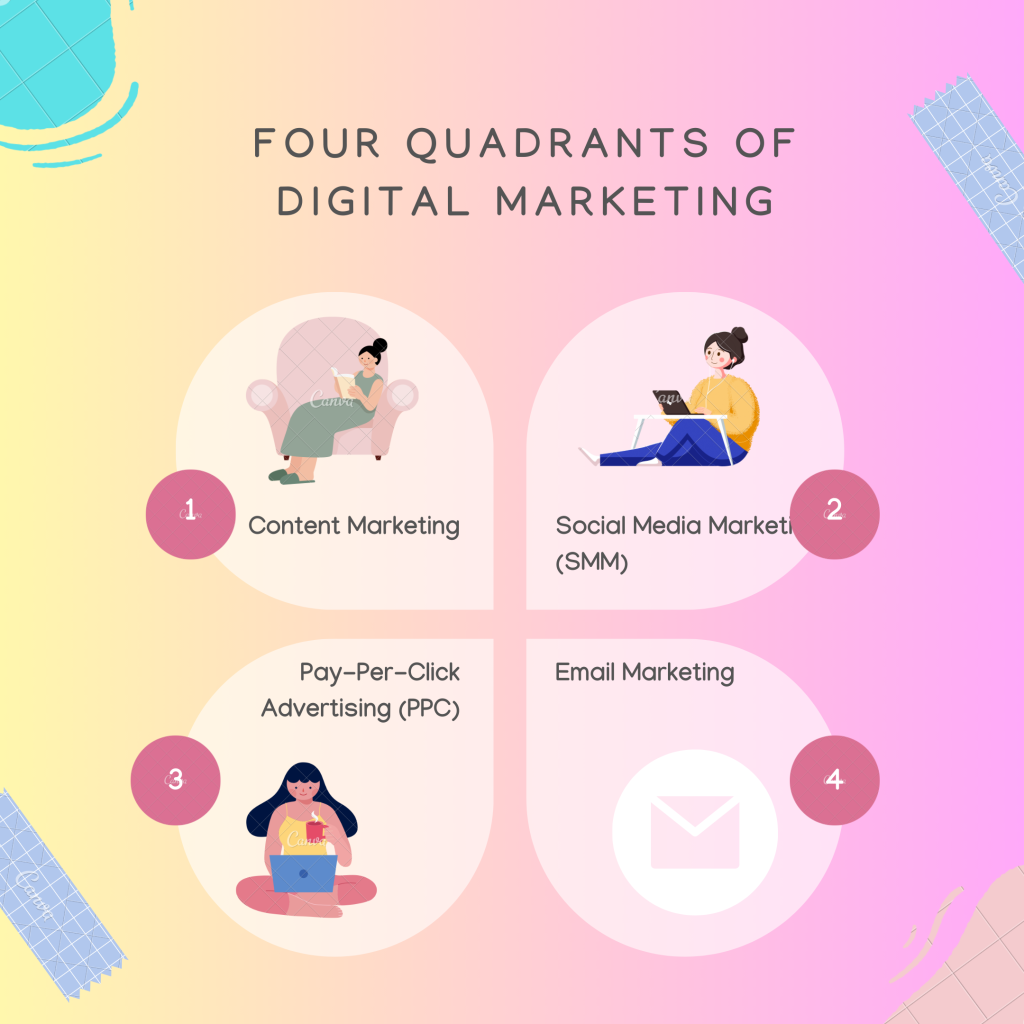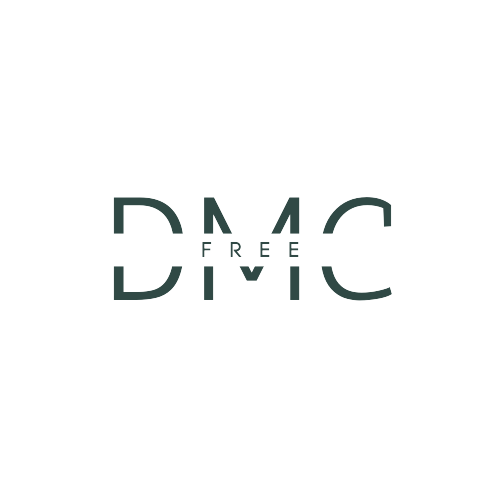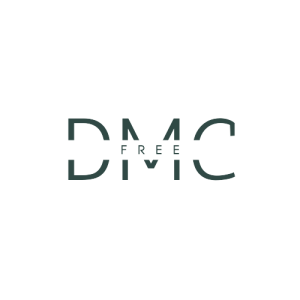
In the rapidly evolving realm of digital marketing, understanding its various facets is crucial for any aspiring marketer. Breaking down the expansive field, we can categorize digital marketing into four primary quadrants. By comprehending each, one can tailor strategies to suit business needs, target audiences more effectively, and drive better results.
Table of Contents
Four Quadrants of Digital Marketing:
1. Content Marketing
- Definition: The creation and sharing of online material such as blogs, videos, and social media posts.
- Key Elements: Blogging, video content, infographics, and podcasts.
- Benefits: Drives organic traffic, establishes brand authority and fosters customer relationships.
- Real-world Example: Companies like HubSpot utilize their blogs to educate readers about marketing, establishing themselves as thought leaders in the industry.

2. Social Media Marketing (SMM)
- Definition: Using social media platforms to promote products, services, or content.
- Key Elements: Platform selection (Facebook, Instagram, LinkedIn, etc.), post scheduling, and engagement tracking.
- Benefits: Enhances brand visibility, engages directly with consumers, and drives website traffic.
- Real-world Example: Coca-Cola’s “Share a Coke” campaign capitalized on personalization and user-generated content on social media, boosting its brand engagement.
3. Pay-Per-Click Advertising (PPC)
- Definition: An advertising model where advertisers pay each time their ad is clicked.
- Key Elements: Keyword selection, bid management, and conversion tracking.
- Benefits: Provides immediate traffic, targets specific audiences, and offers measurable ROI.
- Real-world Example: Google Ads allows businesses to display their ads on Google’s search results, ensuring visibility for relevant searches.
4. Email Marketing
- Definition: Using email to promote products, services, or content.
- Key Elements: List building, email design, segmentation, and analytics.
- Benefits: Direct communication channel, high ROI potential, and personalized targeting.
- Real-world Example: Companies like Mailchimp offer tools for businesses to design, schedule, and analyze email campaigns.
Salaries and Qualifications:
| Country | Average Salary (Annual) | Qualifications Needed |
|---|---|---|
| USA | $65,000 | Bachelor’s degree, Certification in Digital Marketing |
| UK | £40,000 | Bachelor’s degree, CIM Certification |
| Australia | AUD 70,000 | Bachelor’s degree, ADMA Digital Marketing Certification |
| India | ₹800,000 | Bachelor’s degree, Google Digital Unlocked Certification |
Learning Digital Marketing:
If you’re new to this domain, understanding what is Digital Marketing? is the first step. Fortunately, various platforms are offering digital marketing courses free of charge for beginners. Websites like Coursera and Udemy provide foundational courses to help you get started. For those looking to dive into the professional sphere without prior experience, understanding how to Become a Digital Marketer With No Experience is crucial. Moreover, as you gain experience and projects, showcasing them becomes vital.
In conclusion,
As digital marketing continues to evolve, understanding its four key quadrants and the opportunities they present is paramount. Consider checking out HubSpot’s Ultimate Guide to Digital Marketing for a deeper dive into digital marketing. Whether you’re a budding marketer or an established professional, continuous learning and adaptation are the keys to success in this dynamic domain.
FAQs on the Four Quadrants of Digital Marketing
Q1: What is the primary purpose of Content Marketing?
A: Content Marketing aims to create valuable, relevant content to attract and retain a clearly defined audience, ultimately driving profitable customer actions.
Q2: Is Social Media Marketing just about posting regularly?
A: No, effective Social Media Marketing involves strategic planning, creating high-quality content, engaging with the audience, analyzing results, and adapting strategies accordingly.
Q3: Can small businesses benefit from Pay-Per-Click Advertising?
A: Absolutely! PPC allows businesses of any size to display ads for their target audience, ensuring visibility. With a well-optimized campaign, even businesses with a modest budget can see significant ROI.
Q4: How is Email Marketing different from other digital marketing methods?
A: Email Marketing offers a direct line of communication to potential and existing customers. It’s highly personalized, making it effective for nurturing leads and building customer loyalty.
Q5: Do I need formal qualifications to enter the field of digital marketing?
A: While formal qualifications can provide a foundational understanding and give you an edge in job applications, practical experience, self-learning, and understanding platforms like digital marketing courses free can also be immensely valuable.
Q6: How do I decide which digital marketing quadrant to focus on for my business?
A: It depends on your business goals, target audience, and budget. Often, a combination of all four quadrants tailored to your business needs can yield the best results.
Q7: Are traditional marketing methods obsolete with the rise of digital marketing?
A: Not necessarily. While digital marketing offers unparalleled targeting and analytics capabilities, traditional methods can still be effective, especially when used in conjunction with digital strategies.
Q8: How can I showcase my digital marketing skills to potential employers?
A: Creating a robust portfolio, possibly drawing inspiration from Marketing Portfolio Examples, and earning certifications can effectively demonstrate your expertise.
Q9: Is the digital marketing landscape expected to change in the near future?
A: Yes, digital marketing is a dynamic field. As technology advances and consumer behaviors shift, marketers must adapt to stay relevant.
Q10: Can I learn digital marketing on my own without taking any courses?
A: While courses provide structured learning and often come with certification, many resources, including articles, webinars, and online tutorials, are available for free. Self-motivated individuals can certainly teach themselves digital marketing, but formal courses can expedite the learning process.
Always remember digital marketing is an ever-evolving field. Continuous learning and adaptation are the keys to staying updated and relevant.


